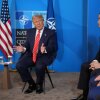
Israeli Prime Minister Benjamin Netanyahu shows an illustration as he describes his concerns over Iran’s nuclear ambitions during his address to the 67th session of the United Nations General Assembly at U.N. headquarters, Sept. 27, 2012. Richard Drew/AP hide caption
toggle caption
Richard Drew/AP
TEL AVIV, Israel — It is a story spanning more than 30 years of rhetoric, and 20 months of war that remade the Middle East.
For decades, Israeli Prime Minister Benjamin Netanyahu wanted to attack Iran, but the United States and his own security chiefs deterred him.
Now, after launching 12 days of strikes on Iran and agreeing to a ceasefire Tuesday, Netanyahu is claiming a “historic victory.”
How did he pull it off now — and recruit the U.S. to join in?

Middle East conflict
Six things to know about Iran’s supreme leader
“All of the chess pieces have moved,” said Reuven Hazan, a political science professor at Hebrew University. “While Netanyahu’s been talking about this for decades, it is only in the last several months that this has all lined up for him and it’s become possible.”
Israel used to be deterred
Netanyahu warned about Iran’s nuclear program for more than three decades, in speech after speech.
A decade ago at the United Nations, he held up a cartoon of a bomb and said Iran was inching closer to an advanced stage of uranium enrichment.
“From there, it’s only a few months, possibly a few weeks, before they get enough enriched uranium for the first bomb,” Netanyahu said at the time.
For the last 20 years, Iran has threatened to destroy Israel. Netanyahu long wanted to bomb Iran’s nuclear facilities, but could not win U.S. support.

In this Nov. 9, 2015, photo, then-President Barack Obama meets with Israeli Prime Minister Benjamin Netanyahu in the Oval Office of the White House in Washington. Andrew Harnik/AP hide caption
toggle caption
Andrew Harnik/AP
For 20 years, the U.S. followed the “hug-and-punch strategy” with Israel, said Ilan Goldenberg, of the liberal pro-Israel advocacy group J Street, who was in charge of tracking Israel-Iran tensions for the Pentagon under the Obama administration.

Middle East
Obama, Netanyahu Differ On How To Deal With Iran
“Demonstrate to the Israelis at every step of the way: ‘We are capable of doing this much more effectively than you are, and we’ve got your back, and we will do it if we need to. And at the same time, don’t you do it,'” Goldenberg said, referring to Israeli desires to strike Iran.
Oct. 7, 2023, was the turning point
After President Trump announced nuclear talks with Iran this year, he said he asked Netanyahu to hold off on any attack.
But by then, Israelis’ own thinking had changed.
Israel used to be deterred from attacking Iran by the threat of retaliation from enemies on its borders: Hamas, Hezbollah and the Syrian regime.
But those threats were beaten back in the last few years of war, and twice last year, Israel got practice rounds bombing Iran following Iranian missile fire.

Middle East conflict
Israel conducts retaliatory airstrikes against Iranian military targets
“Hamas is almost obliterated. Hezbollah has been hit so hard that they are sitting this one out. The Syrian regime has collapsed. And we were able to fly to Iran to take out their anti-aircraft missiles, and to realize that now an operation like this can be done with little damage to us,” said Hazan of Hebrew University.
A focus on Iran benefited Netanyahu over the years
Painting Iran as Israel’s arch-enemy helped Netanyahu distract from Israel’s unresolved conflict with the Palestinians.
“It was always convenient to have some kind of greater risk, not just to Israel, but to the world, in the form of Iran, in order to quiet critiques,” said Lior Sternfeld, a Middle East historian at Penn State University.
This month’s war on Iran also helped Netanyahu with political problems at home. He averted his governing coalition from falling apart and sidelined widespread frustration with the Gaza war.

Middle East conflict
Trump says early report on damage to Iran’s nuclear program was inconclusive

National Security
Why America’s giant bunker-busting bombs may have failed to reach their target
As Trump considered whether to join in the Iran war, Netanyahu was well prepared for the moment.
“The big trophy, the big idea, his big goal, his life’s mission, was always Iran,” said Nadav Strauchler, a former adviser to Netanyahu. “Because he was so into it, it was, I think, easier for him to persuade Trump that this is the right thing to do.”
On June 22, U.S. B-2 bombers struck Iran’s three main nuclear facilities.
“Congratulations, President Trump,” Netanyahu said in a video statement immediately following the U.S. attack. “Your bold decision to target Iran’s nuclear facilities with the awesome and righteous might of the United States will change history.”
A sudden spat between Trump and Netanyahu

President Trump speaks to reporters before boarding Marine One from the South Lawn of the White House in Washington, D.C., on Tuesday. Mandel Ngan/AFP via Getty Images hide caption
toggle caption
Mandel Ngan/AFP via Getty Images
It did not take long for the U.S. to once again deter Netanyahu from attacking Iran.
On Monday, Trump announced he had brokered a ceasefire between Israel and Iran.
At 3 a.m. Israel time on Tuesday — hours before that ceasefire was scheduled to take effect — Israeli warplanes carried out their heaviest round of attacks of the whole war.
They struck Iranian regime targets in the heart of Tehran, killing hundreds of Basij and Iranian security forces personnel, the Israeli government later acknowledged.
Trump did not like that.

Middle East conflict
After lashing out at Israel and Iran, Trump says the ‘ceasefire is in effect’
“I’m not happy with Israel,” Trump told reporters outside the White House Tuesday, and used an expletive on live TV accusing Israel and Iran of ceasefire violations.
Trump ordered Israel not to carry out yet another major bombing campaign in retaliation for what Israel said were three Iranian missiles fired after the ceasefire took effect. Iran’s military denied the missile fire, according to Iranian state media.
Israel relented to Trump’s request. Netanyahu’s office said the Israeli air force struck a radar installation near Tehran but, after a conversation with Trump, it “refrained from additional attacks.”
By the end of the day, in a video address, Netanyahu boasted about the 3 a.m. attacks Trump had criticized.
“A few hours before the ceasefire, we struck the ayatollah’s regime with the hardest blow of all since the start of the war, with the hardest blow in its history,” Netanyahu said.
The gambit helped Netanyahu at home.
The Israeli prime minister’s Likud party grew in popularity in a poll taken at the height of the Israel-Iran war.
Many Israelis, even those who do not support Netanyahu, praised his decision to strike Iran.












